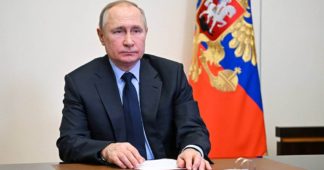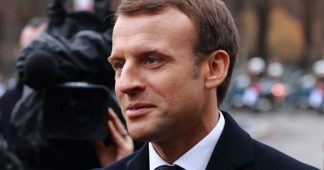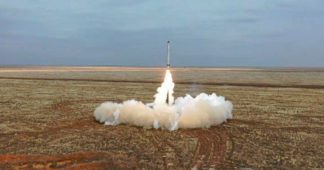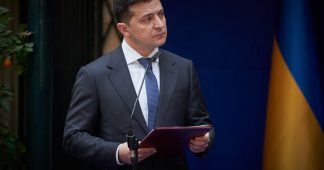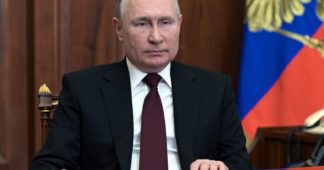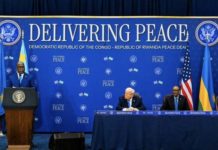We reproduce here an article published at the site of the Gatestone Institute, a Far-Right organization, presided by John Bolton, before he became National Security Advisor to President Trump. The Institute is representative of the neocon forces behind “Trumpism” and US Far Right. We publish it because it is representative of the strategy of the Republican hawks and because many people continue to have dangerous illusions about what the US Right may do upon coming to power.
D.K.
by Guy Millière
- The Ukrainian military urgently needs long-range air defenses and longer-range artillery. It does not have them.
- [Zelensky] said he wanted the war over before Russia could rebuild its forces, and that each additional day of war meant more death and destruction. Above all, he said, not only Ukraine is at stake, but the security and values of the West.
- “History teaches that prolonged conflicts bleed both sides, but dictatorships have an advantage over democracies. They are not accountable to their societies and can pay the price of blood, even with opposition from their citizens…. Does the transatlantic free world still want to occupy a position of leadership? Do we still believe in the universality of values such as freedom and the right of national self-determination?” — Polish Prime Minister Mateusz Morawiecki, Politico, June 27, 2022.
- The almost total destruction of entire cities… has no precedent in Europe since the end of the Second World War. Neither do the horrific war crimes committed in Bucha and other towns on the outskirts of Kyiv and Kharkiv. Nearly two million Ukrainians have been deported and sent to Russia, with some in detention camps in Siberia…. The invasion of Ukraine without a declaration of war is itself a war crime.
- The Baltic states, Finland, Sweden and Poland have every reason to feel threatened: if Putin is not defeated, he will not stop at Ukraine.
- Russia, in 1994, signed the Budapest Memorandum, committing itself to respect the borders of Ukraine. Twenty years later, in 2014, Russia annexed Crimea and created secessionist militia in the Donbass. In 2022, Putin showed that the Budapest Memorandum had absolutely no meaning for him.
- Putin is leading a campaign of annihilating Ukraine’s infrastructure and industrial base. He appears to want Ukraine to become a ruined, non-viable country, virtually impossible to rebuild because the costs would be too high. The more time passes, the higher the costs.
- To achieve his ends, Putin is apparently perfectly willing to hold hundreds of millions of innocent people hostage, and even sentence them to death by starvation. Meanwhile, his propaganda services cynically claim to the countries concerned that the risk of famine results from the Western sanctions against Russia.
- Failing to give Ukraine every means to win… or letting a stalemate set in — or even worse — rewarding Russian aggression by ceding Ukraine’s Donbass and declaring that Russia had “won”, would effectively be announcing to China and all the enemies of the Western world that the power of the West and its ability to command respect belong in the past. Such an outcome would also be telling them that the rules of international law established after the Second World War, and the values that the Western world claims to embody, are now rules and values that the West is incapable of defending.
- A war only ends when there is a winner and a loser. In the present situation, Putin is the ruthless aggressor who tramples all the rules and values of the West. He must be defeated. If he is not, the consequences will not be limited to Ukraine. They will be devastating.
- The Russian military is not invincible. On the contrary, it has shown itself to be extremely deficient and vulnerable. It is the army of a weak state: Russia’s GDP is lower than that of Italy. The Russian army can be crushed and the murderous destruction inflicted on Ukraine can end. What is missing is the clear and concrete will from the West. The United States must lead.
- In Madrid, Biden said, “We are going to stick with Ukraine, and all of the alliance is going to stick with Ukraine as long as it takes to, in fact, make sure that they are not defeated”. He did not say what he should have said, had he wanted to show some strength: Ukraine must win. If it receives the required armaments, Ukraine will win.
- Only an American president has the political and military means to show strength in a credible way. It is tragic that the United States has a weak president just when the future of the world is threatened by so many predatory regimes — all doubtless aware of the small but irresistible window they have at this time.
- “We must aid Ukraine, for to do so in part is our first duty to America and to Americans…. By supporting Ukraine, we prevent larger European conflict. A war that would almost certainly involve America’s military because we have a deep commitment to the NATO treaty and Article Five therein.” — Former US Secretary of State Mike Pompeo.
- “Putin will not stop, unless he is stopped… if the West is aware of what is at stake and sees this war as its own, then this price is not too high. After all, Ukrainians are paying a much higher price. Ukrainians have no choice, since they are defending their country. But the West has no choice either—it is about its future as a community, driven by values and the ability to project these values globally.” — Iryna Solonenko, Senior Fellow at the Zentrum Liberale Moderne (LibMod), Berlin, Internationale Politik Quarterly, April 13, 2022.
May 9, Moscow. The annual military Victory Day Parade was held in Red Square, but with fewer soldiers and military vehicles than in other years. The parade had been cut by 35%. Russian President Vladimir Putin’s short, sober speech tried to justify the war of aggression he had launched against Ukraine on February 24.
Putin seemed on the verge of defeat. A month earlier, in an apparent debacle, the Russian Army had hastily left the Kyiv area. Countless Russian soldiers had been wounded and killed; the loss of military equipment was unimaginable. A report from the UK Ministry of Defence on May 15 said that Russia had lost a third of its combat forces and much of its heavy equipment.
On May 14, Russian troops withdrew from Kharkiv, Ukraine’s second-largest city; they had been pushed back by Ukrainian forces to the Russian border. Russia’s only “victory” was the total destruction of the city of Mariupol, by the Sea of Azov. Communications intercepted by American intelligence services showed that the Russian military had a low morale and that cases of insubordination, mutiny, and refusal to obey orders had multiplied. Russian generals had been killed at the front.
Russian forces then began concentrating their efforts on the Donbass and has been waging a war of attrition ever since. Much of Russia’s modern military equipment has been destroyed; its older equipment dates from the 1960s, but Putin has lots of bombs. Russia has now been bombing Ukrainian positions for weeks. It advances just a little but destroys everything in its path. It has razed not only much of Mariupol, but also Severodonetsk and Lysychansk.
The Ukrainian Army courageously resists, but does not have enough heavy weapons to end the destruction, stop Russia’s offensive or carry out an effective counter-offensive.
Putin seems to be counting on time; he seems betting that the Western world will lose interest in Ukraine and turn to other matters.
The Biden administration at first seemed ready endorse regime change in Kyiv, and US officials even offered Zelensky safe passage out of the country. Zelensky famously answered, “I need ammunition, not a ride.”
Continue reading at www.gatestoneinstitute.org
We remind our readers that publication of articles on our site does not mean that we agree with what is written. Our policy is to publish anything which we consider of interest, so as to assist our readers in forming their opinions. Sometimes we even publish articles with which we totally disagree, since we believe it is important for our readers to be informed on as wide a spectrum of views as possible.
